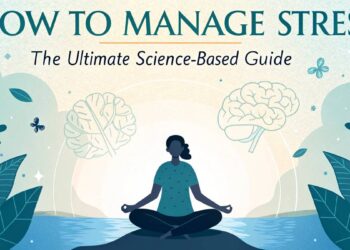In today’s fast-paced world, stress has become an unwelcome companion in our daily lives, silently sabotaging our mental and physical wellbeing. Imagine having the power to transform this invisible enemy into a manageable aspect of life. This comprehensive guide unveils science-backed strategies that empower you to recognize stress triggers, implement effective coping mechanisms, and create a personalized stress management toolkit. Whether you’re battling workplace pressure, academic demands, or personal challenges, mastering stress management isn’t just about surviving—it’s about thriving. Discover how small, intentional changes can dramatically reshape your relationship with stress and unlock a more balanced, fulfilling life.
Key Takeaways
- Unchecked stress can lead to serious physical and mental health issues including anxiety, depression, and heart problems
- Mindfulness techniques like meditation and deep breathing exercises create immediate stress relief
- Physical wellness through regular exercise and proper nutrition forms a crucial foundation for stress management
- Cognitive behavioral techniques help identify and challenge negative thought patterns
- Effective time management and setting realistic goals significantly reduce daily stress
- Social connections and support systems play a vital role in stress reduction
- Relaxation techniques like Progressive Muscle Relaxation provide practical tools for immediate stress relief
- Professional help should be sought when stress becomes overwhelming or persistent
Understanding Stress Management
Keeping stress in check is a must for staying mentally and physically fit. Flex those stress-busting muscles, and you’ll find life just rolls a lot smoother.
Exploring Why We Need to Manage Stress
There’s no two ways about it: stress is the uninvited guest at everyone’s party. It’ll pop up differently for each person – maybe you feel it in a pounding headache, or a cloud of emotions, or even that nagging mental fog. Stick around too long, and it can bring on the big guns like anxiety, depression, and even mess with your heart. Some chill strategies can fend off these nasties and give your life a positive boost.
Let’s break down why keeping stress at bay is a game-changer:
| Benefit | Description |
|---|---|
| Keeps Headspace Clear | Eases anxiety and depression vibes |
| Pumps Up Physical Health | Lowers risk of major illness like heart problems |
| Boosts Emotional Smarts | Helps maintain a sunny outlook |
| Cranks Up Productivity | Keeps the mind sharp at work or school |
Curious about more stress-curbing tricks? Dive into our stress management tips.
How Stress Can Scramble Your Mental Game
Stress isn’t just in your head; it’s a full-body takeover that meddles with your mind. Long-term stress can mess with brain wiring and bring on disorders. Here’s a closer look at how stress messes with the mind:
- Thinking Skills Tank: Stress can jumble up your memory, focus, and decisions.
- Emotional Rollercoaster: It can cause moods to swing like a pendulum and bring overwhelming feelings.
- Mental Health Monsters: Stick with unchecked stress long enough, and anxiety or depression might come knocking.
| Impact | Effect | Consequence |
|---|---|---|
| Messed-Up Memory | Struggle to focus | Less effective work or study |
| Emotional Rollercoaster | Mood swings and snippy days | Sometimes tough on friendships and family |
| Big Bad Mental Strains | Anxiety and depression risks | Might need a therapist to sort things out |
Want to dive deeper into keeping stress from hogging your mental spotlight? Check out our guide on stress management for mental health.
Taking stress head-on with some savvy self-care is the secret to a balanced, happy life. Loads of options are out there, whether it’s soaking in mindfulness or embracing active wellness, there’s something to help everyone take the strain off.
Mindfulness Techniques
Mindfulness is like that underrated friend who always has your back in stress-y moments. By tuning into the now, folks can kick stress and anxiety to the curb and feel more grounded.
“Mindfulness is about being fully awake in our lives. It is about perceiving the exquisite vividness of each moment. Through mindfulness, we awaken from the trance of automatic pilot and reclaim the richness of our experience.” — Jon Kabat-Zinn, Founder of Mindfulness-Based Stress Reduction
Practicing Mindfulness Meditation
Mindfulness meditation isn’t just sitting cross-legged in silence, it’s your brain’s personal spa day. The goal? Notice what’s happening right now without getting swept up in the drama of thoughts and feelings.
Here’s a super chill way to start:
- Find your cozy corner. Cushion, chair, it’s all good.
- Let those eyelids meet and breathe deeply a few times.
- Tune into your breath, feeling it move in and out, like tiny ocean waves.
- If your mind wants to play hopscotch, gently guide it back to your breath.
- Stick with this for about 5-10 minutes, adding more time as you get into the groove.
Beginners might dig using apps or hitting up a local class to get the hang of it. If you’re curious to explore further, hit up our stress management meditation guide.

Deep Breathing Exercises
Deep breathing is like a mini-vacation for your nervous system. It tells your body to chill out, nixing that heart-racey feeling.
Give these a shot:
- Plop down or lie back, like you’re settling in to binge your favorite show.
- Plant one hand on your chest, the other on your belly.
- Sniff in slow through your nose, feeling your belly go up like a soft-serve swirl.
- Blow out gently through your mouth, watching your belly drop.
- Loop this for 5-10 minutes, letting the breath vibes roll.
Try out the 4-7-8 technique for a twist:
| Step | Timing |
|---|---|
| Breathe in slow through your nose | 4 ticks |
| Keep that breath inside | 7 ticks |
| Release through your mouth | 8 ticks |
Work these exercises into your day, and feel stress shrink away. Check out more cool stress management relaxation techniques.
Mindfulness can sneak into different parts of your day, whether you’re on the job, hitting the books, or chilling at home. It’s like having a secret weapon for boosting your mood and mental vibe, and a rad resource for kicking stress management up a notch.
Physical Wellness Strategies
Taking on stress isn’t just a head game—it’s a body game, too. Your body’s well-being plays a big role in keeping stress at bay. So, let’s get moving and munching the right stuff to keep stress from taking the wheel.
“Physical fitness is not only one of the most important keys to a healthy body, but it is also the basis of dynamic and creative intellectual activity. When we take care of our physical health, we’re also taking care of our mental health.” — John F. Kennedy
Regular Exercise and Its Effects on Stress
Getting your body in motion is a top-notch way to boot out stress. When you exercise, your brain churns out endorphins, those feel-good chemicals that nudge pain away and lift your spirits. Breaking a sweat can lift your mood, improve sleep, and knock stress down a peg or two.
Here’s a smorgasbord of exercises good for bashing stress:
- Cardio Fever: Think running, biking, or swimming—stuff that gets your heart thumping and blood pumping.
- Pump It Up: Weightlifting and using resistance bands beef up your muscles and make you mentally tougher.
- Bend, Stretch, and Chill: Yoga and Pilates help you become a flexible, balanced, and clear-minded zen master.
| Type of Exercise | Benefits for Stress Busting | How Often to Do It |
|---|---|---|
| Cardio | Releases endorphins, boosts mood | 30 minutes, 3-5 times a week |
| Strength Training | Builds muscle, sky-rockets confidence | 2-3 times a week |
| Flex and Balance | Calms the mind, sharpens clarity | 3-4 times a week |
Wanna get more out of your exercise gig? Check out our handy guide on stress management exercises.

Importance of Proper Nutrition
Feeding your face right is crucial in the fight against stress. A well-rounded diet loads your body with vitamins and minerals that keep your mind and body humming. Certain foods can mellow you out, while others might have your nerves on edge.
Here’s your eat-smart checklist for kicking stress:
- Balanced Bites: Munch on fruits, veggies, lean meats, and whole grains to keep the good stuff flowing.
- Stay Wet: Drink enough water to keep energy high and fatigue low.
- Cut the Buzz: Too much caffeine and sugar can throw your energy and mood out of whack.
- Clockwork Meals: Eating regularly keeps your blood sugar steady and saves you from the crankies.
| Nutrition Strategy | Benefits for Stress Busting |
|---|---|
| Balanced Bites | Provides goodies, balances your energy |
| Stay Wet | Quashes tiredness, sharpens focus |
| Cut the Buzz | Curbs mood swings, evens energy |
| Clockwork Meals | Keeps blood sugar in check, banishes grumpiness |
Want to dive deeper into how eating right can zap stress? Peek at our piece on stress management and wellness.
With regular exercise and smart meal choices, you can slam the brakes on stress and cruise toward feeling great. For more tips and insights, explore our resources on stress relief activities and stress management for mental health.
Cognitive Behavioral Techniques
Cognitive Behavioral Techniques (CBT) are worth their weight in gold for giving stress a kick in the pants. They help people spot those pesky negative thoughts and swap them out with a kind of positive chatter that’d make even a motivational speaker proud.

Identifying and Challenging Negative Thought Patterns
Let’s be real: negative thoughts are stress’s best buddy. Most folks catch themselves in a spiral of these bad vibes without even knowing it. The trick is to spot ‘em early and shake things up.
- Spot Those Sneaky Thoughts: Keep an ear out for your mind’s running commentary during stressful times. These thoughts pop up like ads at the worst times.
- Give Them the Third Degree: Ask yourself, “Are these thoughts gospel truth or just my mind playing dirty tricks?” Hunt down facts that say otherwise.
- Switch It Up: Once those doom-and-gloomers are busted, swap ‘em for something more down-to-earth and less dramatic.
Check out this little example:
| Situation | Automatic Negative Thought | Challenging Thought | Balanced Perspective |
|---|---|---|---|
| Bombed a Test | “I’m hopeless.” | “One paper’s not the end of the world.” | “Some more study and I’ll ace the next one.” |
| Spat with a Buddy | “They’re done with me.” | “We’ve clashed before and patched things up.” | “No way this busts up what we’ve got.” |
Tidying up your thinking can really mellow you out. For a deeper dive into stress-busting, check out stress management exercises.
Implementing Positive Self-Talk
Talking yourself up is pure magic for shooing away stress. Swap the gloom-and-doom talk with a bit of sunshine, and you’ll be in a better headspace in no time.
- Tune In: Clock that inner chatter. Is it tinged with negativity or hitting you with jabs?
- Flip the Script: Ditch the downers for pep talks. Say nice things about yourself. Really mean ‘em.
- Stick with It: Practice makes perfect. The more you do it, the more natural it becomes.
Here are some cases where talking nice helps:
| Negative Statement | Positive Replacement |
|---|---|
| “This is beyond me.” | “I’ve handled worse. I got this.” |
| “Just not up to snuff.” | “I’ve got what it takes and then some.” |
| “Everything’s hitting the fan.” | “I’ll sort this out, one step at a time.” |
Shift the way you chat with yourself, and stress will lose its edge. For more on how to weave this magic into your life, mosey over to stress management tips.
Using CBT gems like tackling negative thoughts and bringing in positive talk can make stress look like yesterday’s news. Check out more stress management and wellness goodies to keep your mind on track.
Time Management Tips
Nailing time management can be a secret weapon against stress. When folks get a handle on their to-dos and shoot for goals that don’t make you feel like Hercules, life gets a little less frantic and productivity starts hitting new highs.

Prioritizing Tasks
One way to keep stress from crashing your party is to figure out what needs tackling first. It’s all about knowing which fires need putting out now and which ones can wait a tick. Less overwhelm, more handling business like a boss.
The Eisenhower Matrix is a cool way to wrangle those tasks. Split them into four categories and decide what needs your attention most:
| Quadrant | Description | Example |
|---|---|---|
| Urgent and Important | Stuff you gotta deal with right away | Meeting deadlines, medical emergencies |
| Important but Not Urgent | Important but can take a chill pill | Planning, personal growth |
| Urgent but Not Important | In-your-face but not earth-shattering | Interruptions, small favors |
| Not Urgent and Not Important | Neither here nor there | Leisure activities, trivial tasks |
With this handy grid, you’re sorting priorities like a pro and keeping cool under pressure. Got more stress-busting tricks? Check out our reads on stress coping strategies and stress management tips.
Setting Realistic Goals
Setting goals you can actually achieve is like giving stress the boot. Going overboard with what you expect from yourself is just asking for headaches. Instead, keep it real with what you can achieve and bask in the glory of ticking items off your list.
To keep goals on the doable side, think SMART:
| Criterion | Description | Example |
|---|---|---|
| Specific | Crystal clear | “Wrap up the first draft by Friday” |
| Measurable | Easy to keep tabs on | “Shed 5 pounds in a month” |
| Achievable | Not outta reach | “Read a book every month” |
| Relevant | Matches bigger plans | “Join a class to boost career skills” |
| Time-Bound | Has an end date | “Finish by quarter-end” |
Sticking to the SMART game plan means you’re setting goals that inspire rather than intimidate. Fancy more ideas? Dive into our write-ups on how to reduce stress and stress management activities.
Getting your time in order by juggling priorities and hitting realistic goals can be a game-changer for smashing stress and boosting productivity. Whether you’re hitting the books, climbing career ladders, or managing a household, these tricks are sure to help.
Social Support and Connection
Stress management isn’t just about meditation or yoga. It’s about people, too. Yep, hanging out with your pals, calling up the family, or even joining support groups can lighten that stress load big time. Think of these connections not just as folks you know but as your stress-busting team.

Chilling Out with Friends and Family
Ever noticed how talking to a friend makes things feel a little less heavy? That’s because sharing your worries can help you blow off steam and see things differently.
| Perks of Reaching Out | How It Helps |
|---|---|
| Feel-Good Vibes | A kind ear and nodding head |
| Practical Help | Sharing the load, brainstorming solutions |
| Social Fun | Hanging out, making memories |
These catch-ups can deepen relationships since being open about stress helps you feel less alone and more understood. Need more stress-busting fun? Visit our stress relief activities page.
Finding Your Tribe in Support Groups
Support groups are like a community of folks who just get it. They’re a place where you can share stories, swap tips, and find encouragement.
| Types of Support Groups | What They Do |
|---|---|
| Hangouts with Peers | Swap stories, cheer each other on |
| Expert-Led Gatherings | Get tips from the pros |
| Online Groups | Support from afar, anytime |
Being part of these groups helps tackle loneliness and strengthens your arsenal of coping skills. Discover more in our stress coping strategies.
So, whether you’re ringing up your bestie or logging into an online group, remember a solid support network is an ace up your sleeve for managing stress. For even more nifty advice, swing by our stress management tips article.
Relaxation Techniques
Stress is a sneaky little thing, isn’t it? But don’t worry, relief is just around the corner with a couple of nifty tricks—Progressive Muscle Relaxation and Guided Imagery. These will not only help you bounce back but also keep your sanity intact.
Progressive Muscle Relaxation
A trick even the tightest of knots can’t resist, Progressive Muscle Relaxation (PMR) gets your muscles to chill out by first tightening them up—kind of like a tension-eliminating magic trick for your body.
Give PMR a Shot:
- Find Your Happy Spot: Whether it’s a comfy chair or a yoga mat, pick your cozy corner where you won’t be disturbed.
- Start with the Toes: Scrunch those toes till they’re acquainted with tension (5 seconds will do), then let them go limp.
- Work Your Way Up: Step by step, move attention to your calves, thighs, tummy, arms, neck, and up to your face. Squeeze each group for 5 seconds, then set it free.
- Breathe Like You Mean It: Deep breaths in as you tense; a blissful exhale as you release.
For those days when stress refuses to leave you be, PMR’s got your back. And hey, if you’re craving more relief tricks, wander over to our guide on stress management exercises.
Guided Imagery
Now, get ready to ditch the worry with Guided Imagery. Picture yourself in a stress-free zone—imagination is your ticket to tranquility.
Stepping Into Guided Imagery:
- Comfort Is Key: Settle wherever feels right, whether that’s your favorite chair or sprawled on a yoga mat.
- Shut Out the Chaos: Let those eyelids meet and breathe in and out a few times to sync with serenity.
- Dream Up a Calm Scene: Conjure up a calming spot—a sunlit beach, quiet forest, or majestic mountain. Focus on each vibrant detail—the colors, sounds, scents, and vibes.
- Feel It All: Bask in your scene’s glory. Imagine the warmth on your skin, the crash of the ocean, or that fresh, piney aroma.
- Savor the Moment: Linger in this oasis for 5-10 minutes and let your mind wander wherever peace wants to take it.
Whether a rough day or a gust of anxiety hits, this technique is your escape hatch. And if stress-relieving adventures call your name, our post on stress relief activities awaits.
Try one or both of these relaxation nuggets – they help kick stress to the curb while improving your day-to-day vibe. If you’re game for more ways to keep stress at bay, why not check out our piece on how to reduce stress?
Professional Help and Resources
Sometimes our best efforts to shake off a case of the blues just aren’t cutting it. That’s when calling in the pros can be a game-changer. Spotting the right moment to reach out to a mental health whiz can be your golden ticket to feeling better.
When to Seek Professional Help
Figuring out when it’s time to ring up a therapist or counselor can be tricky, but there are some telltale signs. If stress, worry, or feeling down start hogging all your brain space, it might be time to reach out. Here’s what to watch out for:
- Persistent Sadness or Anxiety: If you’re stuck in a rut of sadness or worry for over two weeks.
- Weird Sleep Patterns: Tossing and turning all night or snoozing like a bear in winter? It’s a red flag.
- Trouble Focusing: Can’t keep your mind on track or make simple choices? Stress may be to blame.
- Physical Aches: Nagging headaches, bellyaches, or just feeling wiped out with no good reason.
- Acting Out: Suddenly ditching your crew or overdoing it with booze or substances.
- Daily Life Disruptions: Stress creeping into work, school, or how you vibe with friends and family.
Catching these signals early and getting help can steer you clear of bigger problems down the road. For more tips to handle stress wherever you are, check out our links on stress management at work and stress management for students.
Mental Health Hotlines and Resources
There are loads of folks ready to lend an ear and help out if you or someone you know is struggling. Here’s a quick guide to some go-to mental health resources:
| Resource | Contact Information | Availability |
|---|---|---|
| National Suicide Prevention Lifeline | 1-800-273-8255 | Any time, any day |
| Crisis Text Line | Text “HELLO” to 741741 | Always open |
| Substance Abuse and Mental Health Services Administration (SAMHSA) | 1-800-662-HELP (4357) | Day or night |
| Veterans Crisis Line | 1-800-273-8255 (Press 1) | 24/7 support |
| National Alliance on Mental Illness (NAMI) Helpline | 1-800-950-NAMI (6264) | Mon-Fri, 10 AM – 6 PM ET |
These hotlines are like a lifeline when you’re feeling overwhelmed. They’ll give you the support you need and connect you to resources nearby.
For even more ways to tackle stress, dive into our articles on stress management tips and stress management for mental health.
Getting outside help is a strong move toward keeping stress at bay and your mind in a good place. With these resources, you can find the kind of support that has you living your best life.
Main Tips
- Practice the 5-5-5 breathing technique: Breathe in for 5 seconds, hold for 5 seconds, exhale for 5 seconds to instantly activate your parasympathetic nervous system
- Create a “worry window”—a scheduled 15-minute period each day dedicated solely to addressing worries, then let them go
- Develop a consistent sleep schedule, aiming for 7-9 hours nightly, to boost stress resilience
- Establish clear boundaries between work and personal life, especially when working from home
- Incorporate movement breaks every 60-90 minutes during sedentary activities
- Create a personalized “stress emergency kit” with items that engage your senses (calming scent, smooth stone, favorite melody)
- Practice “brain dumping” before bed by writing down everything on your mind to prevent nighttime rumination
- Limit news and social media consumption to specific times rather than continuous checking
- Use the “STOP” technique when feeling overwhelmed: Stop, Take a breath, Observe your feelings, Proceed mindfully
- Schedule regular social connections, even brief ones, as preventative stress management
Conclusion
Managing stress effectively isn’t a luxury—it’s an essential skill for thriving in our complex world. The strategies outlined in this guide offer a comprehensive approach to transforming your relationship with stress, but remember that stress management is a personal journey. What works brilliantly for one person might need adjustment for another. Start small, be patient with yourself, and celebrate progress rather than perfection.
The beauty of developing stress management skills lies in their compounding benefits—as you build resilience in one area, other aspects of your life naturally improve. Your relationships deepen, creativity flourishes, productivity increases, and health concerns often diminish. By investing time in understanding your unique stress patterns and consistently applying these evidence-based techniques, you’re not just reducing negative symptoms—you’re actively creating a more intentional, balanced, and fulfilling life.
Remember that seeking professional guidance isn’t a sign of weakness but rather a demonstration of your commitment to wellbeing. With persistence and self-compassion, you can transform stress from an overwhelming force into a manageable—and sometimes even motivating—aspect of your human experience.
Would you like me to make any adjustments to this conclusion to better match your goals?
FAQs
What are the most effective stress management techniques for beginners?
For beginners, the most accessible stress management techniques include deep breathing exercises (try the 4-7-8 method), short daily walks, limiting caffeine and sugar intake, and setting aside 5-10 minutes for mindfulness meditation. Start small with achievable goals and gradually build your stress management routine as these practices become habits.
How does stress affect physical health long-term?
Chronic stress triggers a constant release of cortisol and adrenaline, which can lead to serious physical health complications including hypertension, weakened immune system, digestive issues, increased risk of heart disease, accelerated aging, disrupted sleep patterns, and weight management problems. Managing stress effectively is as important to physical health as diet and exercise.
Can stress ever be beneficial?
Yes, short-term stress (known as eustress) can actually be beneficial when channeled properly. It can improve focus, boost motivation, enhance performance, and build resilience. The key is learning to distinguish between positive, motivating stress and harmful chronic stress, then developing strategies to transform negative stress into productive energy.
When should I seek professional help for stress management?
You should consider professional help when stress persists for more than two weeks, significantly interferes with daily functioning, causes persistent sleep problems, leads to withdrawal from social activities, triggers substance use as a coping mechanism, or manifests as physical symptoms that don’t resolve with self-care strategies.
How can I practice stress management in a busy workplace environment?
In a busy workplace, incorporate micro-breaks (60-90 seconds of deep breathing or stretching), practice the “pomodoro technique” (25 minutes of focused work followed by a 5-minute break), keep a stress journal to identify triggers, establish clear boundaries between work and personal time, and utilize your lunch break for a brief walk or mindfulness practice rather than working through it.
Resources
- American Psychological Association – Stress Management
- Mayo Clinic – Stress Management Guide
- National Institute of Mental Health – Stress
- Harvard Health – Stress Management Techniques
- Headspace – Meditation for Stress Relief
- Cleveland Clinic – Stress Management and Emotional Health
Final Thoughts
Managing stress effectively isn’t a luxury—it’s an essential skill for thriving in our complex world. The strategies outlined in this guide offer a comprehensive approach to transforming your relationship with stress, but remember that stress management is a personal journey. What works brilliantly for one person might need adjustment for another. Start small, be patient with yourself, and celebrate progress rather than perfection.
The beauty of developing stress management skills lies in their compounding benefits—as you build resilience in one area, other aspects of your life naturally improve. Your relationships deepen, creativity flourishes, productivity increases, and health concerns often diminish. By investing time in understanding your unique stress patterns and consistently applying these evidence-based techniques, you’re not just reducing negative symptoms—you’re actively creating a more intentional, balanced, and fulfilling life.
Remember that seeking professional guidance isn’t a sign of weakness but rather a demonstration of your commitment to wellbeing. With persistence and self-compassion, you can transform stress from an overwhelming force into a manageable—and sometimes even motivating—aspect of your human experience.
Recommended Products and Accessories
Mindfulness Tools
- Headspace Premium Subscription – Guided meditation app with specialized stress-relief programs for all experience levels Transform your relationship with stress in just 10 minutes a day!
- The Mindfulness Journal – Daily practices, writing prompts, and reflections to build mindfulness habits Your personal guide to developing a life-changing mindfulness practice
Physical Wellness Products
- Gaiam Essentials Thick Yoga Mat – Extra thick mat with carrying strap for comfortable stress-relieving yoga practice Create your personal stress-relief sanctuary anywhere with this premium yoga mat
- Fitbit Charge 5 – Fitness tracker with stress management score, sleep tracking, and activity monitoring Gain powerful insights into your stress levels and track your progress toward better wellness
Relaxation Aids
- InnoGear Essential Oil Diffuser – Ultrasonic aromatherapy diffuser with 7 color-changing lights and multiple mist settings Transform your environment with calming scents that melt stress away instantly
- Weighted Idea Cooling Weighted Blanket – Premium cotton weighted blanket for better sleep and anxiety reduction Experience the deep-pressure comfort that has helped thousands reduce anxiety and improve sleep quality
Cognitive Support
- The Stress Management Workbook – Evidence-based techniques and exercises for managing daily stress Your step-by-step guide to transforming your relationship with stress—see results in just 10 minutes a day
- Five Minute Journal – Structured daily journal for gratitude practice and positive psychology Join millions who’ve discovered how this simple 5-minute practice transforms negative thinking patterns








